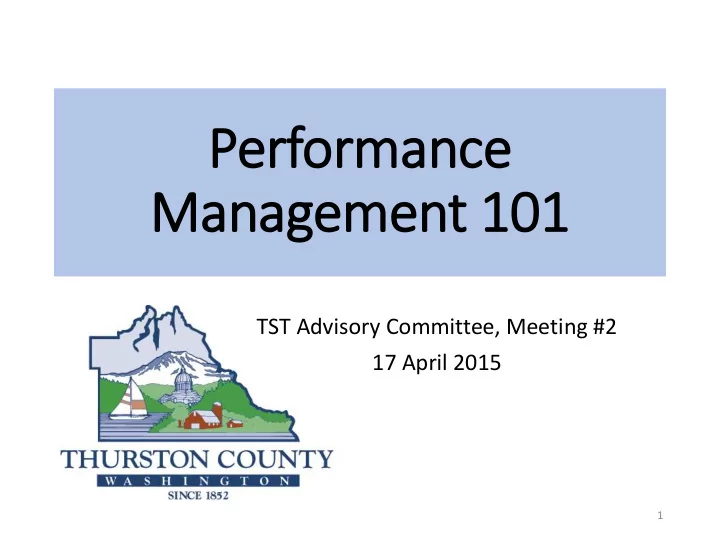

Performance Management 101 TST Advisory Committee, Meeting #2 17 April 2015 1
Overview • Define Key Performance Concepts • Discuss the Plan-Do-Check-Act Cycle • Prepare for the Program Presentations 2
Key Performance Concepts • Performance Measure: 1. A quantifiable expression of the amount, cost, or result of activities. 2. Indicate how well, and at what level, services are provided. 3. Show whether performance is getting better, staying the same, or getting worse. 4. Shows progress toward meeting strategic goals. 3
Key Performance Concepts • Performance Goal or Target: 1. A desired outcome of a strategic, logical process. 2. Must be clearly defined in terms that are measurable (i.e., S.M.A.R.T.) 3. Expressed as an increase, decrease, or maintenance of a performance measure. 4. Should be benchmarked, or compared to something (e.g., national average). 4
Key Performance Concepts • Performance Management: The process of using performance measurement information to help: 1. Make performance goals. 2. Report progress toward meeting goals. 3. Inform decision-making. 4. Prioritize and allocate resources. 5
Plan-Do Do-Act-Check Cycle The Board of County TST-funded Programs plan ways Commissioners considers the to contribute to the goals of recommendation of Thurston Thrives and the Committee and the Public Safety & allocates resources Justice Strategy Maps The TST Advisory Programs execute Committee reviews their plans, measure performance, performance, report prioritizes programs, and their results to decision-makers, recommends program budgets and propose budget changes 6
Program Presentation Outline • Program Description ? Does the program offer evidence-based chemical dependency / mental health treatment or support services as part of such treatment? • Program Goal(s) & Population Served ? Does the program have the right targets? ? Is the program serving the right people? • Strategy Map Connection(s) ? Does the program clearly fit in at least one of the Strategy Maps? ? How directly does the program appear to contribute to the goal(s) of the Strategy Map(s)? 7
Program Presentation Outline • TST-Funded Program Results ? Do these measures clearly demonstrate that the program is contributing to the strategic goal(s)? ? How does this program’s performance compare to others? ? How does the program use data from these measures to inform changes to their operations? ? Is performance getting better, worse, or staying the same? Why? ? What does the program plan to do to improve performance? Does the plan make sense? ? Is the program’s performance and contribution to achieving the goals sufficient to justify funding? 8
Program Presentation Outline • Key Partners ? How dependent is the program on TST funding for its? • Current Problem or Opportunity ? Is it clear that the problem or opportunity are related to program performance? • Proposed Change(s) & Expected Results ? How will these changes result in improved performance and contribute more to the strategic goal(s)? ? What other change could make a greater performance improvement? 9
Questions? Thank you! 10
Recommend
More recommend